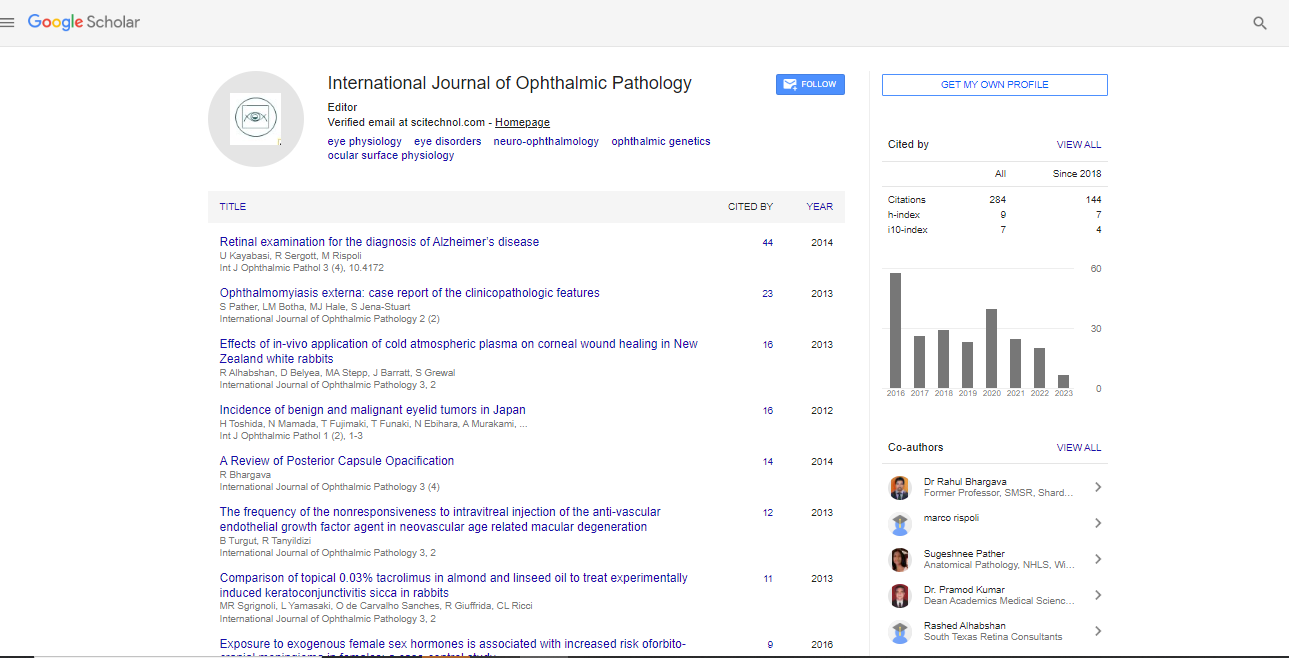Opinion Article, Int J Ophthalmic Pathol Vol: 12 Issue: 6
Managing Ocular-Related Diseases for Optimal Health
Arno Gordon*
1Department of Retinal Research, Oakland University, Michigan, United States of America
*Corresponding Author: Arno Gordon,
Department of Retinal Research, Oakland
University, Michigan, United States of America
E-mail: arngord@oakland.edu
Received date: 24 November, 2023, Manuscript No. IOPJ-23-123979;
Editor assigned date: 27 November, 2023, PreQC No. IOPJ-23-123979 (PQ);
Reviewed date: 11 December, 2023, QC No. IOPJ-23-123979;
Revised date: 18 December, 2023, Manuscript No. IOPJ-23-123979 (R);
Published date: 26 December, 2023, DOI: 10.4172/2324-8599.12.6.051
Citation: Gordon A (2023) Managing Ocular-Related Diseases for Optimal Health. Int J Ophthalmic Pathol 12:6.
Description
The retina, a delicate and vital component of the eye, plays a pivotal role in visual perception. Retinal issues can significantly impact vision and overall ocular health, posing challenges to the individual's wellbeing. Age-Related Macular Degeneration (AMD) stands as a primary cause of vision decline in the elderly, impacting the macula-a focal point for clear vision. The progression of AMD results in the deterioration of central vision, affecting tasks like reading and facial recognition. Diabetic retinopathy, a diabetes-related complication, harms retinal blood vessels, potentially causing vision impairment and in severe instances, blindness. Regular eye examinations and effective diabetes management are pivotal in preventing and addressing diabetic retinopathy.
Retinal detachment, a vital medical emergency, transpires when the retina dislodges, leading to abrupt vision loss. Swift surgical intervention is imperative to reattach the retina, averting permanent vision impairment. Additionally, retinitis pigmentosa, a hereditary condition, induces a gradual breakdown of retinal light-sensitive cells, resulting in tunnel vision and in some cases, blindness. Although no cure exists, ongoing analysis explores potential treatments for this progressive ailment. In the realm of retinal care, innovative approaches have emerged, bringing in new aspects of treatment. Pharmacological interventions, such as Anti-Vascular Endothelial Growth Factor (Anti-VEGF) injections, prove instrumental in addressing wet Age-Related Macular Degeneration (AMD) by curbing abnormal blood vessel leakage into the retina. Steroid implants offer an alternative for conditions like diabetic macular edema, mitigating inflammation and promoting retinal health.
Surgical interventions encompass vital procedures like vitrectomy, which involves removing the vitreous gel to treat conditions like retinal detachment and macular holes. Retinal laser surgery finds application in sealing leaking blood vessels, halting the progression of disorders like diabetic retinopathy. Noteworthy is the realm of retinal gene therapy, demonstrating the potential for improving genetic abnormalities linked to inherited retinal disorders. These targeted gene interventions possess potential for long-term solutions in preserving retinal function. The advent of artificial retinas or retinal implants marks a technological milestone, aiming to restore vision in those with severe visual impairment due to retinal diseases. These devices stimulate remaining healthy retinal cells, contributing to improved light perception and opening avenues for enhanced visual rehabilitation.
Regular eye exams are essential for the early detection and monitoring of retinal issues. Advancements in diagnostic tools such as Optical Coherence Tomography (OCT) and fundus photography enable ophthalmologists to assess retinal health with precision. Early intervention and monitoring plays a vital role in preserving vision and managing retinal disorders effectively. Certain lifestyle modifications can contribute to maintaining retinal health and preventing the progression of retinal issues. This includes adopting a diet rich in nutrients that support eye health, such as omega-3 fatty acids, lutein and zeaxanthin. Smoking cessation and managing systemic health issues like diabetes also play a vital role in preventing and managing retinal disorders.
For individuals facing vision impairment due to retinal issues, vision rehabilitation programs offer support in adapting to changes in vision. These programs may include orientation and mobility training, assistive technology and counseling to enhance overall quality of life. Effective management of retinal issues often requires a multidisciplinary approach. Collaborative care involving ophthalmologists, optometrists, retinal specialists and other healthcare professionals ensures comprehensive and customized treatment plans for individuals with retinal disorders.
Conclusion
Overcoming retinal issues for visionary wellbeing involves a combination of early detection, innovative treatments, lifestyle modifications and collaborative care. Advances in pharmacological interventions, surgical techniques, gene therapy and artificial retinas demonstrate evolving terrain of retinal care. Emphasizing the importance of regular eye exams, lifestyle modifications and vision rehabilitation contributes to preserving and enhancing visionary wellbeing in individuals facing retinal challenges. As the analysis and technology continue to progress, the outlook for individuals with retinal issues has potential for improved treatments and better outcomes, emphasizing the significance of ongoing efforts in the field of retinal care.
 Spanish
Spanish  Chinese
Chinese  Russian
Russian  German
German  French
French  Japanese
Japanese  Portuguese
Portuguese  Hindi
Hindi 